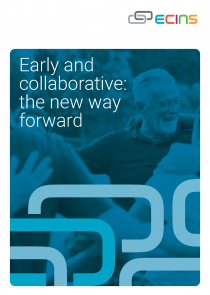Nottinghamshire is one year in to a two-year project to prove the benefits of E-CINS within six defined workstream areas across the county:
-
Vulnerable Persons Panels, dealing with a critical few who are the most vulnerable in the county;
-
Anti Social Behaviour;
-
Victim Support;
-
Restorative Justice;
-
Integrated Offender Management.
-
Nottinghamshire is also the first county in the UK to use E-CINS for Key Individual Networks/Beat Management.
Sadie Booth is ECINS Implementation Manager working from Nottinghamshire PCC’s office. Sadie spoke to Empowering- Communities about the process of introducing ECINS into the county and how the key to success has been through equal input from all agencies involved.
“We have tried to learn from some of the mistakes that counties before us have stumbled over and have found it beneficial to start small and defined. What we have been really good at is coming from a holistic multi- agency starting point, getting the right people around the table from the beginning, working together to decide how best to introduce ECINS across the county. It feels like a truly multi-agency system rather than something implemented by the police.”
The ECINS multi-agency team, who are fully integrated across all six workstreams, currently include:
Seven district councils; Nottinghamshire county council; city council; police; Nottinghamshire Fire and Rescue; Social Care; Housing Agencies; Victim Support; Remedy (Restorative Justice providers); Nottinghamshire Improving Lives (Victim Services); Probation in Ashfield; Community Safety; Prisons (for IOM); Youth Services; Youth Offending Teams and Youth Offending Service.
“E-CINS is enabling us to bring consistency to our processes. We have been able to streamline so that we have just one referral form for each workstream area rather than the seven different ways of working we had before. We will be carrying out a review to look at cost savings and efficiencies gained from using ECINS with a view to looking at turning off legacy systems next year.”
Nottingham Fire and Rescue have put together a bespoke multi- agency training package for ECINS practitioners which they deliver at their IT suite at Carlton Fire Station. So far they have delivered 15 training days with more dates due to take place in May. The fire brigade dedicated two officers to the ECINS project to carry out the training. “Some police officers tend to be quite cynical due to constantly changing procedures and IT systems. However they were coming to the training and you could literally see the penny drop – one officer said he could see all his neighbourhood work being carried out on the system with no need to use anything else.” said Sadie. Nottinghamshire has an E-CINS Project Board chaired by Kevin Dennis, Chief Executive of the PCC’s office.
There is also a Working Group for each workstream area and the chairs of each working group go the Project Board meeting each month. The whole county is now live on ECINS with all agencies engaged in the project and going through the process of training their staff.
There is an Information Sharing Group which consists of all the agencies involved in the scheme and they are in the final stages of completing and signing the Information Sharing Agreement. The Agreement has been designed so that all agencies coming on board only need to sign up to the workstream areas they wish to operate in, rather than all areas. “Each time a new agency comes on board we ask them what they want to use the system for. If they are only interested in the Vulnerable Persons Panels, for example, then they only need to sign up to the VPP annexe. Nottinghamshire police will sign up to all six annexes. The annexe shows them exactly what they can share and that gives them confidence” said Sadie.
Ashfield, who have been using the system for two years, are using ECINS as their sole case management system and are now looking at implementing ECINS for environ- mental health, trading standards, housing, customer care management and complaints. They are also looking at turning off their legacy system FLARE and migrating to ECINS for the whole of their council function.
“Having the timely access to partner agency information enables us to better assess the needs of our clients and the people we are serving and it enables our response to them to be individually targeted” said Sadie. “It has been tough getting everybody coming from the same angle but It’s about being brave and looking forward to what those efficiencies will eventually be. It’s also about being able to make the changes that are needed to deal with the new challenges that are coming. New legislation such as in the Crime and Disorder Act means we need to access each others information in order to do our jobs effectively. We need to work together and ECINS is a system that helps us to do that. It helps us work together to share information in this new world.
Some of the challenges I have faced include agencies who say they don’t want to change because they have their own system. I say that is a naïve viewpoint as they do not have a system that enables them to see other people’s information at the point when they need it.
We spent a lot of time looking at what processes are in place, the police use NICHE – they will always need that. There will be certain intelligence and criminal investigations that other partners don’t need to see. It’s about having a clear process as to when a case transfers from a sole police function to when it needs to be a multi-agency case.
In Nottinghamshire we have a flowchart that shows officers when a case needs to be transferred from NICHE to ECINS. We highlight on ECINS that the initial management of the case is held on NICHE under a reference number. This enables the case to be transferred without any extra work involved. People aren’t being forced to change the way they work and there is no need duplicate the information. No doubt the further down the line we go there will be more automation of information and integration of systems that will enhance our working processes further.”


